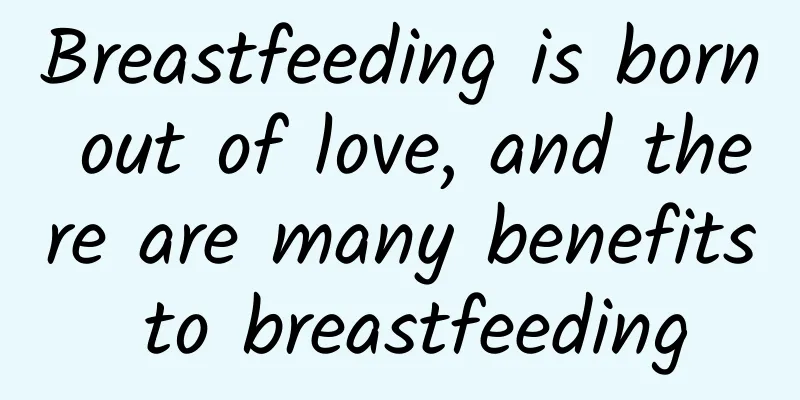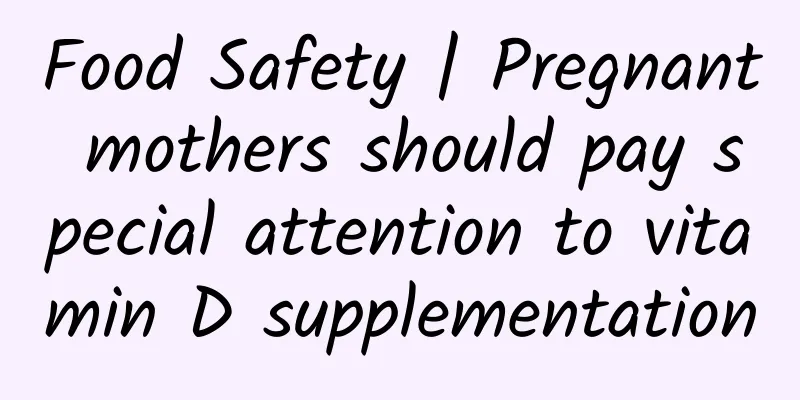Breastfeeding is born out of love, and there are many benefits to breastfeeding

|
This is the 3868th article of Da Yi Xiao Hu Breasts are not only a part of a woman's beautiful curves, but also a channel for milk secretion, storage, and discharge. Breast milk is an important link in the transmission of maternal love and a precious gift from mother to baby. The hundreds of days from the mother's pregnancy to the baby's two-year-old is a critical window period for enhancing the child's immunity and preventing adult diseases. Breastfeeding is not only beneficial to the baby's physical growth and intellectual development, and reduces the occurrence of chronic diseases in adulthood, but also has many benefits for the mother. Breastfeeding has many benefits for mothers both psychologically and physically: 1. The breastfeeding process can enhance the mother-child relationship, experience the privilege of being a mother, and give the mother a sense of accomplishment; at the same time, breastfeeding can help mothers reduce the incidence of postpartum depression. Postpartum depression is caused by postpartum hormone disorders. Adhering to breastfeeding, the process of the child sucking milk will promote hormone secretion, allowing the mother to return to a calm and relaxed mood. 2. Studies have shown that breastfeeding can reduce the risk of breast cancer. Conversely, no history of breastfeeding or breastfeeding for less than 4 months is also a risk factor for breast cancer. The protective mechanism of breastfeeding has not yet been clearly studied, but many scientific studies generally believe that estrogen is an important stimulating factor for the occurrence and evolution of breast cancer, while pregnancy and lactation-specific hormones such as progesterone and prolactin are protective hormones. Breastfeeding may reduce the risk of malignant transformation of mammary duct epithelial cells by prolonging the protective effect of beneficial hormones and correspondingly shortening the stimulating effect of estrogen. And the process of milk discharge itself can also normalize the milk ducts to a certain extent, and expel cells with damaged genetic genes in the breast, thereby reducing the risk of breast cancer. 3. Breastfeeding can promote uterine involution and reduce postpartum hemorrhage. Long-term breastfeeding can also reduce the risk of ovarian cancer, cardiovascular disease, osteoporosis and obesity. 4. Help mothers recover and lose weight after childbirth. Breast milk is divided into colostrum, transitional milk and mature milk, and its main components are: protein, carbohydrates, fat, vitamins, minerals, and immune components. The fat and other nutrients discharged during breastfeeding can reduce the mother's metabolic burden and restore the body to its pre-pregnancy slim curve as soon as possible. Having said the benefits of breastfeeding for mothers, breastfeeding also has great significance for babies. For babies: 1. Breast milk is the most ideal natural food for babies. Breast milk is safe, rich in enzymes that babies need, easy to digest and absorb, can promote the development of the baby's intestines, and also contains rich antibodies, which can help babies gain immune protection and reduce the occurrence of diseases. 2. Breast milk contains all the nutrients a baby needs within 6 months after birth. Even breast milk after 6 months is still an important source of energy and high-quality nutrients for the baby. 3. Breastfeeding is not only beneficial to the emotional development of babies, but also can meet the oral needs of babies to a certain extent and enhance the development of their brains and senses. Breastfed children perform better in intelligence tests, are less likely to be overweight or obese, and are less likely to suffer from type 2 diabetes or other metabolic diseases when they grow up. Therefore, the World Health Organization recommends: 1. Start breastfeeding within one hour after birth; 2. Infants should be exclusively breastfed for the first six months of life to achieve optimal growth, development and health; 3. Breastfeeding should continue for two years or longer. In recent years, with the improvement of social economy, cultural level and women's social status, more and more women are unwilling to breastfeed their babies in order to maintain a beautiful figure, or give up breastfeeding due to work pressure. This is harmful to both themselves and their babies. "Feeding" is born out of love. We hope that every woman will pay attention to breast health, insist on breastfeeding, and build a healthy defense line together. Author: Jia Hongyan The First Hospital of Shanxi Medical University Director of Breast Surgery Chief Physician Doctoral Supervisor Academic and Technical Leader of Shanxi Province Chief Science Communication Expert of Shanxi Province |
<<: Can soda water adjust the body's acid-base balance? Rumors on the June "Science Rumors List"
>>: Because loneliness chooses it, it will make you more lonely
Recommend
What should I do if I get pregnant with hypothyroidism?
Hypothyroidism is a disease that is somewhat here...
The neglected health risk indicator-high blood sugar
"Hyperemia" can reflect the abnormal st...
How to deal with accidental injury incidents?
How to deal with accidental injury incidents? Wha...
Anovulatory abnormal uterine bleeding
As a woman, you should pay attention to a balance...
5G smartphone penetration is expected to reach 72% in 2024
A series of recent research reports released by T...
What is bleeding in urine during sex?
Bleeding in urine during sexual intercourse is an...
Common diseases and health-influencing factors among school-age children
Spring is a season with a high incidence of infec...
What are the signs before a pregnant woman's water breaks?
The rupture of amniotic fluid in a pregnant woman...
Will the new coronavirus be on the fruits you buy? How can you eat the fruits you buy safely during the epidemic?
Affected by the new coronavirus, many places have...
What is the significance of National Day? When does the National Day free highway start?
The term "National Day" first appeared ...
What should I do if I feel weak after an abortion?
Modern people's attitude towards life has bec...
What are the symptoms of fungal vulvovaginitis
Candidal vaginitis is a relatively common disease...
What is the yellow smell of leucorrhea?
Abnormal leucorrhea is a very common gynecologica...
How to make a woman's small breasts bigger
In today's society, women have higher require...
What causes menstrual dysmenorrhea?
Dysmenorrhea is not unfamiliar to female friends....









